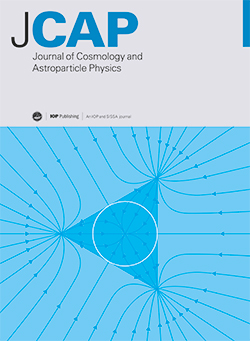任何地方的一切都是热的:中微子和热暗物质作为一个单一的有效物种
IF 5.3
2区 物理与天体物理
Q1 ASTRONOMY & ASTROPHYSICS
Journal of Cosmology and Astroparticle Physics
Pub Date : 2025-01-17
DOI:10.1088/1475-7516/2025/01/077
引用次数: 0
摘要
观测宇宙学正在迅速接近中微子质量总和的测量,至少在最简单的宇宙学中是这样,同时为非标准热暗物质(HDM)模型的探测打开了大门。通过扩展有效分布的方法,我们证明了任何具有任意质量、温度和分布函数的HDM种的集合,包括大质量中微子,都可以表示为单个有效HDM种。在自由流动粒子的FlowsForTheMasses非线性微扰理论中,我们研究了除标准中微子外还包含热QCD轴子或一般玻色子的非标准HDM模型,以及中微子分布函数或其温度发生变化的非标准中微子模型。在此过程中,我们大大提高了该微扰理论在低质量下的精度,使其与高分辨率天奴中微子n -体模拟结果一致,在k = 0.1 h/Mpc时为≈2%,在k≤1 h/Mpc范围内为≤21%。我们精确地再现了包括轴子和多质量中微子在内的模拟结果。研究了正常中微子、倒立中微子和简并中微子的质量排序在非线性功率上的差异,量化了简并中微子质量一般近似的误差。我们在http://github.com/upadhye/FlowsForTheMassesII公开发布我们的代码。本文章由计算机程序翻译,如有差异,请以英文原文为准。
Everything hot everywhere all at once: neutrinos and hot dark matter as a single effective species
Observational cosmology is rapidly closing in on a measurement of the sum Mν of neutrino masses, at least in the simplest cosmologies, while opening the door to probes of non-standard hot dark matter (HDM) models. By extending the method of effective distributions, we show that any collection of HDM species, with arbitrary masses, temperatures, and distribution functions, including massive neutrinos, may be represented as a single effective HDM species. Implementing this method in the FlowsForTheMasses non-linear perturbation theory for free-streaming particles, we study non-standard HDM models that contain thermal QCD axions or generic bosons in addition to standard neutrinos, as well as non-standard neutrino models wherein either the distribution function of the neutrinos or their temperature is changed. Along the way, we substantially improve the accuracy of this perturbation theory at low masses, bringing it into agreement with the high-resolution TianNu neutrino N-body simulation to ≈ 2% at k = 0.1 h/Mpc and to ≤ 21% over the range k ≤ 1 h/Mpc. We accurately reproduce the results of simulations including axions and neutrinos of multiple masses. Studying the differences between the normal, inverted, and degenerate neutrino mass orderings on their non-linear power, we quantify the error in the common approximation of degenerate masses. We release our code publicly at http://github.com/upadhye/FlowsForTheMassesII.
求助全文
通过发布文献求助,成功后即可免费获取论文全文。
去求助
来源期刊

Journal of Cosmology and Astroparticle Physics
地学天文-天文与天体物理
CiteScore
10.20
自引率
23.40%
发文量
632
审稿时长
1 months
期刊介绍:
Journal of Cosmology and Astroparticle Physics (JCAP) encompasses theoretical, observational and experimental areas as well as computation and simulation. The journal covers the latest developments in the theory of all fundamental interactions and their cosmological implications (e.g. M-theory and cosmology, brane cosmology). JCAP''s coverage also includes topics such as formation, dynamics and clustering of galaxies, pre-galactic star formation, x-ray astronomy, radio astronomy, gravitational lensing, active galactic nuclei, intergalactic and interstellar matter.
 求助内容:
求助内容: 应助结果提醒方式:
应助结果提醒方式:


